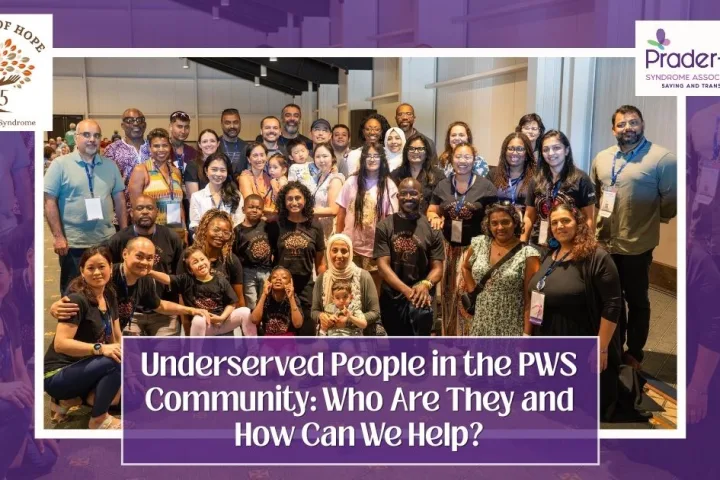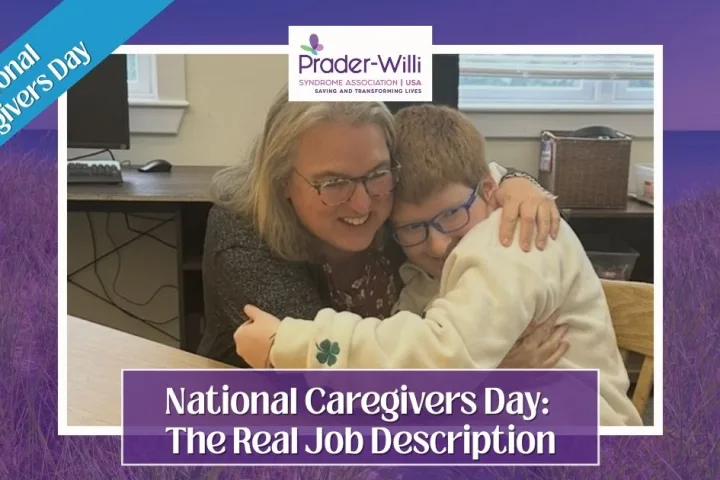August is National Make-a-Will Month, a time dedicated to the important task of planning for the future. At PWSA | USA (Prader-Willi Syndrome Association | USA), we are excited to mark this month by launching our new planned giving resources, designed to help you make a meaningful impact through legacy gifts.
Planned giving allows you to leave a lasting mark on our mission to support individuals and families affected by Prader-Willi syndrome (PWS). By incorporating PWSA | USA into your will or estate plan, you ensure that our critical programs (Family Support, Advocacy, and Research) continue to thrive into the future. This kind of gift is more than just a donation—it’s a powerful way to create a legacy of compassion and change.
Why Consider a Legacy Gift?
- Make a Lasting Impact: Your gift will help fund crucial research, educational programs, and support services that improve the lives of those affected by PWS. By planning a legacy gift, you ensure that our work continues and evolves to meet future needs.
- Personal Fulfillment: Many donors find immense satisfaction in knowing their contributions will have a lasting effect. As you reflect on your own values and experiences, a legacy gift allows you to align your personal goals with our mission.
- Flexibility and Control: Planned giving options are diverse and can be tailored to fit your financial situation and charitable goals. From bequests and charitable trusts to beneficiary designations and more, you have the flexibility to choose a plan that best suits your needs.
Potential Tax Benefits: Depending on the type of gift you choose, there may be significant tax advantages. Consult with a financial advisor to explore how a legacy gift can benefit both you and PWSA | USA.

Hear from Those Who Have Made a Difference
We recently spoke with former PWSA | USA board member and PWS parent Jim Koerber who shared why formalizing his legacy contributions to PWSA | USA has been so critically important:
“Like many of us, when someone does something good for you, you want to return that good deed. In my case, I volunteered my time, talent, and treasures. I no longer serve on any of the chapters or PWSA | USA national board, however, I continue to make donations and have established a planned gift. In a world where things can sometimes be overly complicated, we often yearn for simple ways to accomplish our goals. The most important thing is that you create a lasting legacy and a long-term impact. Our goal has always been for our child to be the best Prader-Willi syndrome person she can be, and through the help of the association, we’ve accomplished that – with our ups and downs, of course. I hope others consider this long-term aspect of planned giving and the long-term benefits it has.” – Jim Koerber, former PWSA | USA Board Member and PWS parent.
How to Get Started
If you’re interested in leaving a legacy gift to PWSA | USA, our newly launched planned giving resources on our website are here to guide you. You’ll find detailed information on various giving options, helpful tools, and answers to your questions. Our team is also available to assist you in creating a plan that aligns with your goals and values.
To learn more about our planned giving resources and to begin making your legacy plans, visit PWSA | USA’s Planned Giving Page HERE today. Your future support will help ensure a brighter tomorrow for those affected by Prader-Willi syndrome.
Thank you for considering this impactful way to give. Together, we can create a legacy of hope and support that lasts for generations to come. Have YOU named PWSA | USA in YOUR will or estate plan? We’d love to know about it and we welcome your testimonial to help inspire generosity in others. Contact Director of Development Melanie McDonald at mmcdonald@pwsausa.org or by phone at 941-487-6742.
Share this!





 Perry A. Zirkel has written more than 1,500 publications on various aspects of school law, with an emphasis on legal issues in special education. He writes a regular column for NAESP’s Principal magazine and NASP’s Communiqué newsletter, and he did so previously for Phi Delta Kappan and Teaching Exceptional Children.
Perry A. Zirkel has written more than 1,500 publications on various aspects of school law, with an emphasis on legal issues in special education. He writes a regular column for NAESP’s Principal magazine and NASP’s Communiqué newsletter, and he did so previously for Phi Delta Kappan and Teaching Exceptional Children. Jennifer Bolander has been serving as a Special Education Specialist for PWSA (USA) since October of 2015. She is a graduate of John Carroll University and lives in Ohio with her husband Brad and daughters Kate (17), and Sophia (13) who was born with PWS.
Jennifer Bolander has been serving as a Special Education Specialist for PWSA (USA) since October of 2015. She is a graduate of John Carroll University and lives in Ohio with her husband Brad and daughters Kate (17), and Sophia (13) who was born with PWS. Dr. Amy McTighe is the PWS Program Manager and Inpatient Teacher at the Center for Prader-Willi Syndrome at the Children’s Institute of Pittsburgh. She graduated from Duquesne University receiving her Bachelor’s and Master’s degree in Education with a focus on elementary education, special education, and language arts.
Dr. Amy McTighe is the PWS Program Manager and Inpatient Teacher at the Center for Prader-Willi Syndrome at the Children’s Institute of Pittsburgh. She graduated from Duquesne University receiving her Bachelor’s and Master’s degree in Education with a focus on elementary education, special education, and language arts. Evan has worked with the Prader-Willi Syndrome Association (USA) since 2007 primarily as a Crisis Intervention and Family Support Counselor. Evans works with parents and schools to foster strong collaborative relationships and appropriate educational environments for students with PWS.
Evan has worked with the Prader-Willi Syndrome Association (USA) since 2007 primarily as a Crisis Intervention and Family Support Counselor. Evans works with parents and schools to foster strong collaborative relationships and appropriate educational environments for students with PWS. Staci Zimmerman works for Prader-Willi Syndrome Association of Colorado as an Individualized Education Program (IEP) consultant. Staci collaborates with the PWS multi-disciplinary clinic at the Children’s Hospital in Denver supporting families and school districts around the United States with their child’s Individual Educational Plan.
Staci Zimmerman works for Prader-Willi Syndrome Association of Colorado as an Individualized Education Program (IEP) consultant. Staci collaborates with the PWS multi-disciplinary clinic at the Children’s Hospital in Denver supporting families and school districts around the United States with their child’s Individual Educational Plan. Founded in 2001, SDLC is a non-profit legal services organization dedicated to protecting and advancing the legal rights of people with disabilities throughout the South. It partners with the Southern Poverty Law Center, Protection and Advocacy (P&A) programs, Legal Services Corporations (LSC) and disability organizations on major, systemic disability rights issues involving the Individuals with Disabilities Education Act (IDEA), Americans with Disabilities Act (ADA), and the federal Medicaid Act. Recently in November 2014, Jim retired.
Founded in 2001, SDLC is a non-profit legal services organization dedicated to protecting and advancing the legal rights of people with disabilities throughout the South. It partners with the Southern Poverty Law Center, Protection and Advocacy (P&A) programs, Legal Services Corporations (LSC) and disability organizations on major, systemic disability rights issues involving the Individuals with Disabilities Education Act (IDEA), Americans with Disabilities Act (ADA), and the federal Medicaid Act. Recently in November 2014, Jim retired.